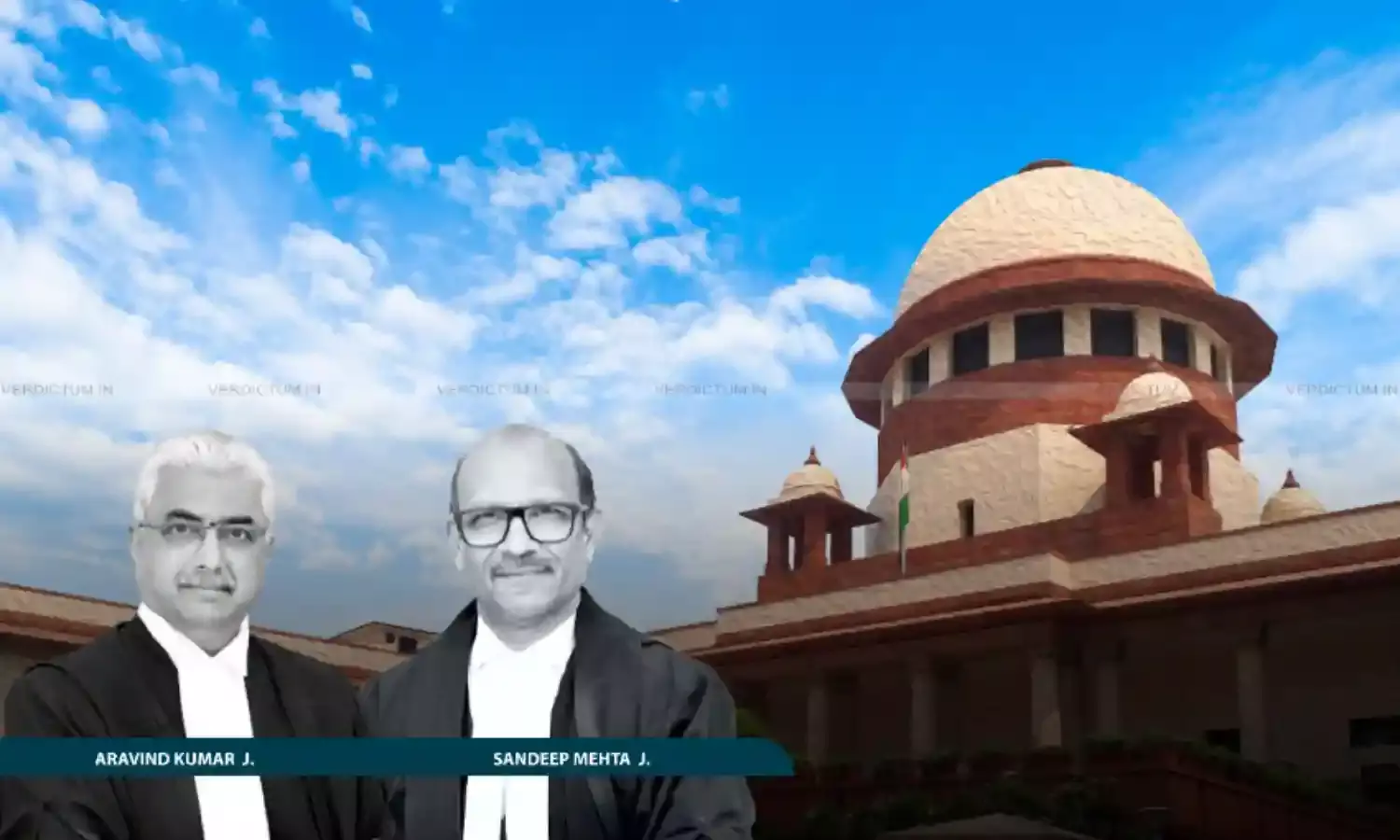Exclusive Control Of Alleged Forged Document Must Be Proved In Absence Of Direct Evidence When Document Has Passed Through Several Persons: Supreme Court
The appellant approached the Supreme Court questioning the correctness and legality of the judgment of the Bombay High Court.

Justice Aravind Kumar, Justice Sandeep Mehta, Supreme Court
While acquitting a student accused of committing forgery by submitting tampered documents for college admission, the Supreme Court has affirmed that the exclusive control of the alleged forged document must be proved when there is lack of direct evidence to connect the alleged forgery to the accused especially in a case where the alleged document has passed through the hands of several persons before forgery is detected.
The appellant approached the Apex Court questioning the correctness and legality of the judgment of the Bombay High court affirming the order altering the sentence imposed by the trial court upon the appellant accused.
The Division Bench of Justice Aravind Kumar and Justice Sandeep Mehta held, “Exclusive control of the alleged forged document must be proved when there is lack of direct evidence to connect the alleged forgery to the accused especially in a case where the alleged document has passed through the hands of several persons before forgery is detected. If the same is not proved, at best, the evidence on record may arouse suspicion but they do not establish beyond reasonable doubt that the accused had forged, or knowingly used, or attempted to cheat by use of such forged documents.”
AOR Lambat & Legiteam represented the Appellant while Advocate Anand Dilip Landge represented the Respondent.
Factual Background
It was the appellant’s case that she was a student of Bachelor of Social Work (BSW) at Aniket College of Social Work affiliated to Nagpur University. She appeared for the summer session examination of 1998 BSW Part-I and was declared as ‘failed’. Thereafter, to secure admission in BSW Part-III course she submitted her admission form along with her mark-sheet and revaluation notification which was verified by Admission Clerk (acquitted as Accused 3), attested by the principal (acquitted as Accused 2) and sent to the University for further process where the examination department noticed the alleged forgery and cancelled her admission.
It was alleged by the prosecution that the marks in the Compulsory English Subject were altered from “10” to “18” in the mark-sheet and from “10” to “30” in the notification, and on the basis of such tampered documents she attempted to secure admission to BSW-III course. On the basis of a letter received by the University, an FIR came to be registered, and after investigation petitioner was charge-sheeted, and the name of the other two accused were inserted.After the trial, all the three accused were convicted. On an appeal, the sentence was modified and affirmed in the revision petition. On Revision, by all the accused persons, the Revisional Court by the impugned order acquitted the two co-accused persons while upholding the conviction of the first accused. Aggrieved thereby the accused approached the Apex Court.
Reasoning
The Bench, at the outset, explained that to attract offence of Section 468 IPC, the prosecution must establish that the accused made a false document within the meaning of Section 464 IPC, with intent to cheat. It further explained that Section 471 IPC requires proof that the accused used a forged document as genuine, knowing or having reason to believe it to be forged at the time of its use.
Coming to the facts of the case, the Bench noticed that the material evidence disclosed that the documents passed through institutional hands for scrutiny, endorsement and forwarding and at certain points of time it was not in the custody of appellant at all. “In such circumstances, the passing of the alleged document through the hands of several person before it was detected as forged renders unsafe to arrive at a conclusion that appellant had authored the tampering or possessed the contemporaneous knowledge of such tampering. It is apt to mention that it is well-established principle of law that suspicion, howsoever grave, cannot replace the standard of legal proof”, it stated.
It was also noticed that no handwriting or forensic expert opinion was obtained regarding the authorship of alleged tampering. “While expert opinion is not mandatory, nevertheless when authorship is central to establish the guilt of the accused and by direct evidence it is not demonstrated to show that the alleged writing has been made in the presence of a witness, non-examination of an expert or any other cogent proof of authorship to corroborate the alleged forgery beyond reasonable doubt weighs heavily against the prosecution. Therefore, the courts below treated “apparent overwriting” as conclusive which approach is alien to the standard proof beyond reasonable doubt”, it added.
Moreover, it was noticed that in the absence of evidence that the appellant had dishonest intention to either make the false document or knew of its falsity while submitting it, the mental status or mens rea remained unproved. The Bench reiterated that Section 313 is not an empty formality. In the present case, it was on record that the accused was not possibly able to understand the incriminating circumstances put against her and was not able to answer properly because of the compound questions. “Nevertheless, the courts have relied upon the statement which in our considered view causes prejudice to the accused”, it added.
The Bench was of the view that all the courts, while appreciating the evidence on record had confined themselves to the issue of establishing the alleged tampering. However, the prosecution had not discharged its burden on authorship of the alleged forgery. Thus, allowing the appeal, the Bench set aside the conviction of the appellant under Section 420 read with Section 511 IPC Sections 468 and 471 IPC together with the sentences imposed.
Cause Title: Vandana v. State of Maharashtra (Neutral Citation: 2025 INSC 1098)
Appearance
Appellant: AOR Lambat & Legiteam
Respondent: Advocate Anand Dilip Landge, Advocates Siddharth Dharmadhikari, AOR Aaditya Aniruddha Pande, Advocate Shrirang B. Varma

